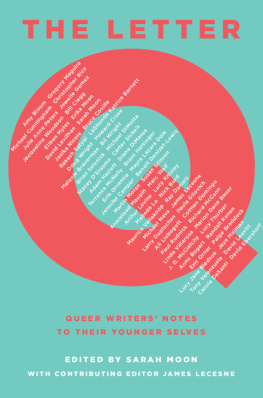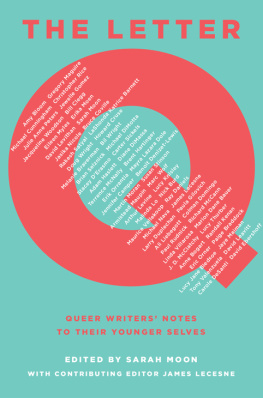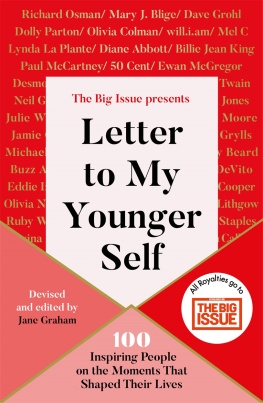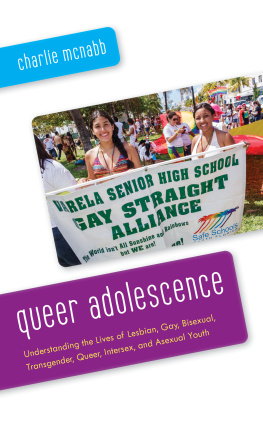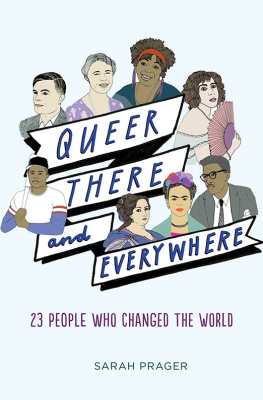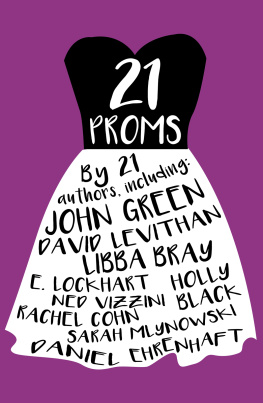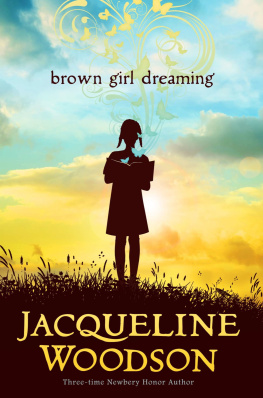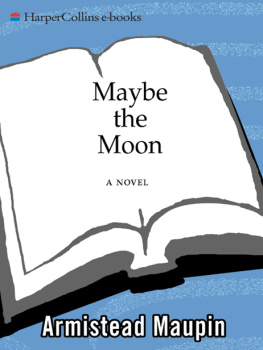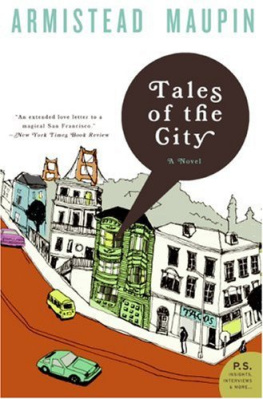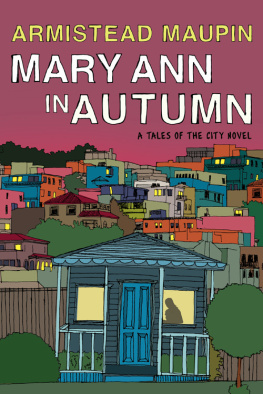
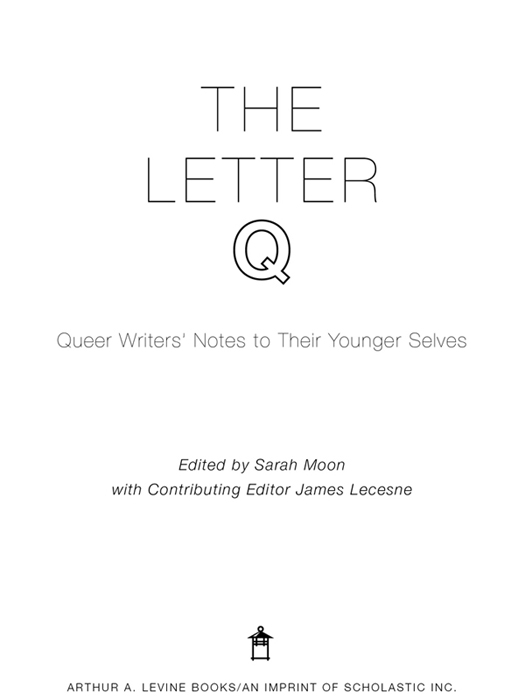


Thanks for reading. We hope you like this book.
When I (Sarah) was a kid, I was really lucky and really unlucky. Unlucky because I lived in the middle of nowhere and was an enormous homosexual; I knew it, my friends knew it, every-one knew it. Long before I came out to myself or to anyone else, people were calling me a dyke or a boy in school every day; they spit on me and threw eggs at my house. Not such great luck.
Luckily, though, I found myself surrounded by adults whod been through what Id been through and lived to tell the tale. They werent like a lot of people I knew; they werent hypocritical, or scared, or unbelievably boring. They were these smart, queer, caring people who decided to help me. They told me stories. They wrote me letters. I folded them up and carried them with me to school every day. In the beginning of tenth grade, things started getting a lot worse. I was sick of it. I started shouting back at the people who called me names. Not exactly the path of least resistance. My friends started to feel like hanging out with me was pretty risky. I started eating lunch in the bathroom. Then, I found the back stairwell where it was quiet and there was a window. Id sit on the stairs with my french-fry lunch (very clever revenge on health-food-nut parents, I thought), and Id take out the right letter for whatever was going on that day. When the school ruled against the Gay-Straight Alliance and it became clear to me that I would be spending much of the year in the principals office, or one kid had followed me around calling me a dyke all morning and I just couldnt imagine facing the rest of my day, I would take out the one that said, This is the life of an activist in a small town. It is not permanent, but it is difficult. I swear to you, you will not be sixteen forever. When I was crushing on straight girl after straight girl after straight girl, I got some hard-learned advice: First of all, the straight ones are no fun. Second of all, they will break your heart. I settled for them too, back in the day. But the good stuff is worth waiting for. When I finally found a gay girl to date, I read the one that came with instructions: Ask her out, honey! Call her up and take her to the movies. Halfway through, hold her hand. When we broke up (after three weeks) it was: The first one hurts the worst. Its okay to hug pillows and cry until you can deal. When I started to hurt myself my junior year, the directions were clear: You need to talk to your mama. And there was one that I read every day, one that saw straight through me, that said, You are not a terrible person, baby. You are terrified and angry. The more you talk, the more itll lessen. I promise you. Now promise me. I had no idea how she knew. I promised.
So, what does someone who hated school grow up to be? A teacher, of course. Thats how I know that while a lot has changed since I was a teenager, a lot hasnt. Ive taught in cities and suburbs, public and private, even a jail, and they all have one thing in common theyre full of kids who are trying to make their ways through moments of fear, insecurity, doubt, despair, confusion, hilarity, openheartedness, giddiness, and overwhelming joy. Just like all of us.
It didnt seem quite fair to me that I should have been the only teenager to get wonderful letters to carry around with her. The first person I asked to write a letter for this book was James Lecesne, founder of The Trevor Project, an organization dedicated to preventing LGBTQ teen suicide. You can get in touch with them anytime, day or night; check the back pages of this book for more information. Together, James and I asked writers we trusted, liked, admired, and made us laugh to write letters telling their younger selves what they could do to make their lives a little better, a little lighter. In turn, they asked their writer friends to do the same, and we have this book. The letters we got back are funny, kind, and honest, like the best sort of people. Mostly, though, they are very good company.
We hope they help.
All our love,
Sarah and James
Dear Amy,
T heres all sorts of good news from here in the future: You really will get the hang of high heels (you will not go through life feeling like a soft-boiled egg on stilts) and then you will have a big fat epiphany and choose not to do that to your feet (except for very special occasions). You will not be waitressing into middle age. (You could but you wont have to.) Your abysmal performance in all things mathematic wont really matter (computers and calculators and common sense will fill in your ginormous educational gaps).
Please, love your eighteen-year-old body because its not gonna get better than that. (Better at tennis and the foxtrot, yes more perfect, no.)
So lets talk about everything your dear body can do, will do, and does.
Most of the sensible adults you know will say if they say anything at all bad things about one-night stands. Im not so sure. They are people certain types, certain experiences that you might not want to miss out on. Be careful, be smart (you know what this means: Do not have sex with anyone if youre not capable of driving yourself home; use condoms, always, always; no sketchy drugs from sketchy guys, and good luck knowing when to bail). Once is sometimes enough and once is sometimes necessary. If you hadnt cuddled up in nothing but your panties to that cute girl from the other high school after a night of rock and roll and her mothers Tia Maria you might not have known that you liked girls too. And that would have been a shame. Its true, you dont know anyone just like you, but theyre out there. And, furthermore, what strikes you as an unusual but not disturbing penchant is going to make your life bigger and better, as well as bumpier. It will probably help you become the very good couples therapist that you become. (Did I mention this? You become a shrink and then a writer. I know you really did think youd be waitressing at OMalleys into your fifties.) When the men say their wives nag them to death, you sympathize, cause youve had girlfriends. When the wives say that they wouldnt nag if the knucklehead just listened the first time, you sympathize, cause youve had boyfriends.
I know you worry that you dont have enough sticking power, that when you get fed up, you leave, and not too many people get a whole three strikes. You worry that you cant stay the course of things that matter. I know you worry that your distant father and anxious mother have produced in you mostly a desire to get out of Dodge at the first signs of disappointment. You will get better at this, although you do sorry to tell you continue to struggle. You will discover that your mothers warmth and your fathers unshakable and baseless confidence in you, although it takes the form of no intervention and not much interest, combine to make you a loving, weirdly confident person. Could be worse.
You will find yourself with a best friend (thirty years and counting), a beloved sister (yes, you start talking to each other, finally), three amazing children who have many of your best qualities and only some of your faults, and the kind of spouse (as it turns out, a husband) you hoped for and thought youd never find.
Next page
